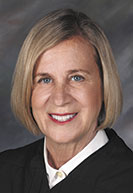Subscriber Benefit
As a subscriber you can listen to articles at work, in the car, or while you work out. Subscribe NowThe Indiana Supreme Court is considering a proposal that would bring graduates of law schools outside the United States and non-American Bar Association-accredited schools one step closer to being able to sit for the state bar exam.
The proposed changes, announced in November, would amend Admission and Discipline Rule 13. If amended as proposed, the rule would allow graduates of non-ABA-accredited schools to sit for the Indiana bar in two situations:
• If the applicant graduated from a non-ABA-accredited law school in the United States, was eligible to sit for the bar in another state, and the Board of Law Examiners finds the applicant is qualified to take the Indiana bar by education or experience.
• If the applicant completed legal education outside the U.S., obtained a graduate degree in American law from an ABA-approved school, and the BLE finds the applicant is qualified to take the Indiana bar by education or experience.
Also, the proposal lays out the materials a person seeking a waiver of the educational requirements would have to provide to the BLE, including a narrative of the person’s legal education and work history, among other materials.
For Purdue Global Law School, the proposal, if adopted, would be a welcome first step in Indiana.
Purdue Global Law, formerly known as Concord Law School, is an online-only law school based in California — the only state where its graduates can currently take the bar due to its lack of ABA accreditation.

“I’m happy to see that the Indiana Supreme Court is considering taking this step,” Purdue Global Law School Dean Martin Pritikin said. “My only concern about the court’s proposal is that students won’t know at the time they enroll in law school if the Indiana Board of Law Examiners is going to approve their individual petition three, four years down the road.”
Also, Pritikin said he doesn’t think the proposal gets them all the way there in terms of encouraging nontraditional students to go to law school.
Still, “I think it’s a good first step and an important first step,” he said.
If the proposal is adopted, Pritikin said he hopes there will be a data analysis a few years down the road that shows how many graduates are petitioning to take the exam and how they perform.
If the results are promising, he said, the high court may consider going a bit further.
Striking a balance

Court of Appeals of Indiana Judge Nancy Vaidik — who sat on the Indiana Supreme Court’s Purdue University Concord Law School Working Group — said she knew the court’s proposal was coming.
Vaidik noted that Indiana ranks among the lowest states in the nation in terms of number of attorneys per capita.
According to the 2020 ABA Profile of the Legal Profession, there were 2.3 lawyers per 1,000 people in Indiana. The lowest number reported was 2.1 lawyers per 1,000, in South Carolina, Arkansas and Arizona.
While some areas of the state, such as Marion County, have higher numbers locally, others do not, Vaidik added.
“A lot of rural counties are one per every 1,000 (persons) and a lot of communities within communities, like communities of color or the public service sector, are woefully underserved,” she said. “We have to find solutions to that in some way, and this is just but one of the solutions.”
Vaidik gave an example of a woman who works in southern Indiana and is a Purdue Global Law graduate. The woman passed the bar in California, Vaidik said, but she’s working as a paralegal because she can’t take the bar exam in the Hoosier State.
However, the woman could litigate a case filed in the U.S. District Court for the Southern District of Indiana.
“Something’s wrong with that,” Vaidik said.
In her view, Vaidik said what the high court is proposing provides quality assurance and consumer protection for law students, lawyers and potential clients alike.
“I think this strikes a great balance,” she said.
Bar leaders weigh in
The Supreme Court accepted public comment on its proposal through Dec. 15. One group that submitted feedback to the court was the Indiana State Bar Association, which is supporting the proposal.
That’s a change from the ISBA’s earlier position, when it opposed a proposal released this spring by Purdue University.
Purdue’s proposal would have amended Rules 6, 13 and 17.1 to allow graduates of certain non-ABA-accredited schools to take the Indiana bar if the school was accredited by one or more state, regional, or national bodies that specifically accredit law schools. Also, under Purdue’s proposal, the school must be operated by or affiliated with an Indiana-based educational institution whose legal education program/degree has been approved by the Indiana Commission for Higher Education.
“Without confirming that all such entities’ standards align with what we in Indiana consider crucial to providing a high-quality legal education and that all such entities have a robust procedure for monitoring accreditation compliance, we do not support allowing graduates of law schools accredited by those other entities to sit for the Indiana bar,” former ISBA President Amy Noe Dudas wrote to the Supreme Court in April.

But in a Dec. 6 member alert, Senior Judge Tom Felts, the new ISBA president, said the high court’s proposal is different than Purdue’s.
“Although the current proposal doesn’t include a specific provision for Indiana accreditation, the ISBA believes it succeeds in providing a sufficient vetting process,” Felts wrote in comments to the Supreme Court. “Indiana’s Board of Law Examiners has long been the gatekeeper for minimum competency of Indiana attorneys. Relying on this board to review requests from otherwise qualified law school graduates would be an effective solution to ensuring that candidates are adept in legal practice, helping to maintain a more proficient legal community.”
Felts also wrote that the proposed changes have the potential to increase the availability of proficient lawyers in the state while still ensuring a qualified entity vets the candidates’ petition to sit for the exam.
On the other hand, the Indianapolis Bar Association — which also opposed the Purdue proposal — urged the high court to proceed with caution in its approach.
IndyBar listed three questions for the high court to consider:
1. Will the acceptance of students from non-ABA-approved law schools lead to an even greater gap in practical, experiential education of students before they begin practicing law?
2. Will the proposed modification of Rule 13 lead to increased access to service in Indiana’s rural areas?
3. Does the all-volunteer Board of Law Examiners have the resources to conduct the case-by-case review of applications contemplated by the proposed amendment?
“… ABA accreditation serves to set standards to ensure national uniformity in legal education and practice. A non-ABA-approved law school presents a level of flexibility and financial opportunity which could be a barrier to many wanting to enter the legal field. We agree and support the sentiment that allowing those who attended a law school not approved by the ABA would offer a path to those seeking to be admitted in Indiana,” IndyBar wrote in its comments to the Supreme Court.”
But it continued, “We would ask the Court to consider including a more detailed understanding of an applicant being ‘eligible upon graduation from that law school to take the bar exam of another state.’ Creating a benchmark of courses required or preparation for the bar exam would further ensure that the applicant’s education, whether ABA accredited or not, has adequately prepared them for the bar exam.
“… We salute the Court’s aspiration to improve access to legal services for Hoosiers most profoundly affected by a shortage of lawyers and we echo the Court’s feeling that this proposed rule amendment will not, by itself, solve the state’s shortage issue,” 2023 IndyBar President Rebecca Geyer wrote in the letter. “However, we see no data or anecdotal evidence to suggest that students at non-ABA-approved schools, who are scattered across the nation (indeed, even Purdue Global’s law school is based in California) will set up practices in rural communities in Indiana. Likewise, our anecdotal experience suggests that foreign law graduates are unlikely to practice law in those communities most adversely affected by a shortage of lawyers in rural Indiana communities.”
National change coming?
While the Indiana Supreme Court considers its proposed changes, an ABA group has put forward a proposal that could provide another step toward accreditation for online schools like Purdue Global Law.
The Council of the ABA Section of Legal Education and Admissions to the Bar is accepting comment through Jan. 8 on its proposed revisions to Standards 701 and 702.Under the proposed revision to Standard 701, law schools would be required to have “adequate operations,” rather than “facilities,” a move designed to incorporate technology.
“A law school need not have a physical campus, provided it can show that its operations, equipment, technology, and technology support are adequate to enable it to operate in compliance with the Standards and carry out its program of legal education,” Interpretation 701-2 says.
As for Rule 702, the proposal would require law schools to ensure the availability of suitable rooms for in-person classes, specifically, rather than “all” classes.
Schools would also have to ensure the availability of a law library that is suitable and sufficient in size and location and accommodates the needs of the students and faculty accessing the library remotely.
Pritikin said those proposed changes don’t fully allow schools like Purdue Global Law to apply for ABA approval because there being other standards that bar them from getting that accreditation.But he added that the ABA has mentioned putting those standards out for public comment, as well.•
Please enable JavaScript to view this content.

